

California Agricultural Coalition hosts March 19 press conference to highlight priorities for agriculture
By: California Farm Bureau
What: The California Agricultural Coalition, including the California Farm Bureau, California Cotton Ginners & Growers Association, California Association of Winegrape Growers and Western Tree Nut Association, will host a press conference to discuss the group’s key agricultural priorities for the upcoming legislative year.
Who: Speakers will include:
• Shannon Douglass, President, California Farm Bureau
• Michael Miiller, Director of Government Relations, California Association of Winegrape Growers
• Roger Isom, President/ CEO, California Cotton Ginners & Growers Association and Western Tree Nut Association
When: Wednesday, March 19, 2025, 12:15 p.m. - 12:45 p.m. PT
Where: West side of the California State Capitol (10th and N Streets), Sacramento Why: Speakers will address critical issues impacting California agriculture:
• California faces an alarming trend toward farm consolidation.
The state lost farms and farmland at 7,387 farms – a 10.5% decrease –between 2017 and 2022, with irrigated lands decreasing by more than 120,000 acres during that time frame.
• California’s regulatory costs create a competitive disadvantage for the farmers growing a majority of the country’s fresh fruits, nuts and vegetables. According to a recent study, regulatory compliance costs on farmers have surged by 1,366% since 2006, with a 63.7% increase since
2017.
• California farmers and ranchers play an important role in the state’s ability to meet its greenhouse gas reduction goals, with working lands already an important solution to reaching climate goals. Agriculture programs lead the list of the most efficient cap and trade programs, so continued Greenhouse Gas Reduction Funds in support of agriculture programs provides a good ROI.
• Senate Bill 628, authored by Senator Shannon Grove (R-Bakersfield) and co-sponsored by the California Farm Bureau and the California
Association of Winegrape Growers, increases the take-home pay for agricultural employees and delivers millions of dollars into hardpressed economies in rural California by investing in agricultural employees through an employer payroll tax credit. Under SB 628, only after employees have been scheduled and paid overtime wages can employers earn a payroll tax credit to help cover the labor cost increases from overtime.
The press conference is scheduled to coincide with California Agriculture Day at the Capitol.


As I sit here and write this months’ article, I am reminded that I have just completed my first year of having the privilege as serving as president of this great organization. It has been an absolute honor serving Merced County Farm Bureau and representing Merced County Agriculture across the state. We have just held our 107th Annual Meeting last week and it was a wonderful event as always. I also have an ask of our great membership that involves water on the east side of this county we call home.
Merced Irrigation District has recently received a draft from the State Water Resources Control Board entitled “draft 401 Water Quality Certification”. It is related to Federal Energy Regulatory Commission (FERC) relicensing of New Exchequer and McSwain dams on the Merced River. This draft would have severe detrimental effects on farmers and residents in eastern Merced County. This new regulation mandates that certain temperatures be maintained on the Merced River to promote fish habitat, these temperatures would be
unobtainable with the inflow and storage that is under control of MID. It would also make MID responsible for all water in the Merced River to the convergence with the San Joaquin River, although MID has no way to control or any jurisdiction of about 30 miles of river. This draft would all but end the voluntary agreements being sought by MID and other stakeholders in regards to the Bay Delta Plan. If these demands are not met, control of the dam and water would be turned over to the state. The impacts of the implementation of these regulations would be devastating. When the possible effects of these regulations are added to SGMA it would severely limit the amount of available water to farms and municipalities. This does not only harm agriculture but also residential water and quality of that water. We can all help by spreading the word and contacting our elected officials and expressing our concerns, in the form of letters, e-mails, and phone calls.
Last Thursday Merced County Farm Bureau held
our 107th Annual Meeting at the Merced Fairgrounds. It was a well-attended event with a delicious meal. Thank you to everyone that worked hard to make it a successful event. Thank you to all that attended, donated a dessert, bought a dessert, supported our YF&R group in their silent auction that benefited Farm PAC. Those of us in attendance were treated to hearing our California Farm Bureau First Vice President, Mr. Shaun Crook speak and give us a run-down of what is going on at the state level. You may have noticed that there was no live auction, other than dessert, at this year’s meeting. We have opted to hold a sweepstakes, for a one-hundred-dollar donation you can choose to have your name entered in a drawing for one of four great prizes valued at one thousand dollars each. If you are interested or for more information, please contact our office or see page 22. We also bid farewell to seven board members who are retiring from your board of directors, two of them Bob Giampaoli and Jean Okuye, also served as county presidents, we thank all of
them for their dedication and hard work. We also welcome seven new board members to fill those vacancies and look forward to working along side them to promote and protect Merced County agriculture.
We are in the middle of a fairly wet March, but before we know it spring will be here and we will all be busy harvesting and planting. Next month we will be hosting our annual Agribee spelling and definition competition held at the Mainzer Theater in Merced and open to 4th & 5th graders from across the county. Merced County Farm Bureau continues to advocate and promote Merced County Agriculture. We are only as strong as our members; you are our strength. Please consider answering a call to action regarding State Water Resources Control Board proposed regulation, spread the word and share your concerns. If you have any questions or concerns about this or anything else, please reach out to any board member or our office and we would be happy to help! Until next month!

Celebrating National FFA Week: A Week of Fun and Community
By: Valexis Vang, El Capitan FFA Chapter Reporter
This year, our FFA chapter celebrated National FFA Week with an exciting lineup of activities that brought together students, teachers, and the community. Each day featured a unique event and spirit day that highlighted the values of leadership, service, and agriculture, making the week both enjoyable and meaningful.
Monday: Morning Wave with FCCLA
We kicked off the week by teaming up with Family, Career and Community Leaders of America (FCCLA) for a collaborative Morning Wave.
Both FFA and FCCLA members proudly displayed signs promoting their organizations while welcoming students and community members with enthusiasm and energy. To add a sweet touch, donuts were handed out, and everyone was encouraged to wear blue and gold, showing their FFA pride.
Tuesday: Tractor/Truck Pull
Tuesday revved up the excitement with a Tractor/
Truck Pull event, showcasing students’ skills and enthusiasm for agricultural machinery. Participants put their strength and strategy to the test while competing in this classic FFA challenge. To complement the physical activity, everyone donned their best workout wear, adding a fun and sporty twist to the day.
Wednesday: Teacher Lunch
Midweek, we honored our teachers with a special lunch featuring delicious linguica sandwiches, refreshing drinks, and chips. Tables were decorated to create a warm and inviting atmosphere, showing our
appreciation for the educators who support us throughout the year. To add to the fun, students twinned with a teacher, making for a day full of laughter and camaraderie.
Thursday: Bingo
Thursday brought an exciting round of Bingo, where students competed for prizes in a relaxed and enjoyable setting. Friends also got in on the spirit by dressing alike for Twin Day, adding an extra layer of fun and unity to the celebration.
Friday: Kiss the Goat
The grand finale of our FFA Week was the highly anticipated Kiss the Goat event! Teachers were selected
and voted on to kiss the goat. Teachers and students alike participated in this humorous and memorable tradition, much to the delight of the crowd. In honor of Valentine’s Day, everyone wore pink or red, creating a vibrant and cheerful atmosphere.
National FFA Week was a huge success, filled with activities that strengthened our chapter’s bonds, showcased our dedication to agriculture, and brought smiles to many faces. We’re already looking forward to making next year’s celebration even bigger and better!



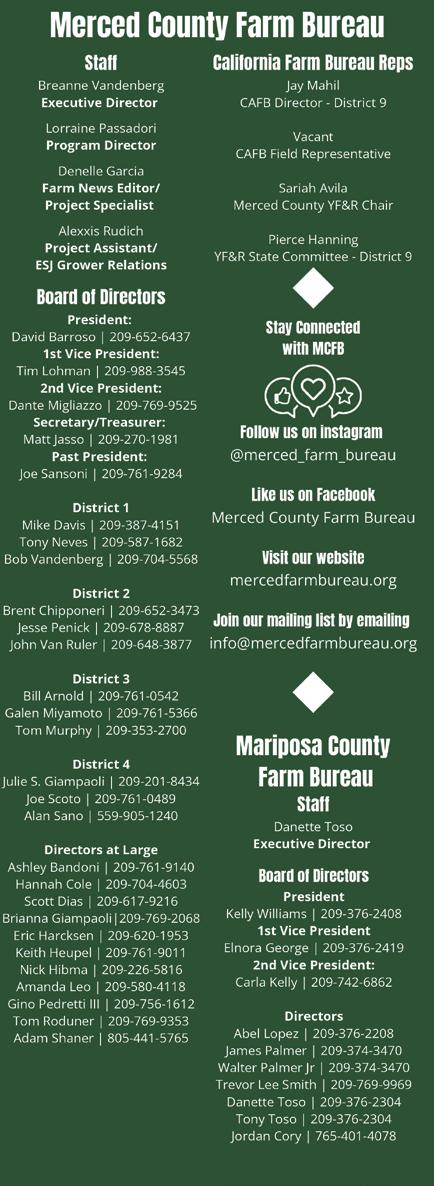
California Milk Advisory Board Announces Transition In Leadership
CEO John Talbot Shares 2025 Retirement Plan; VP of Business Development Bob Carroll on Tap to Lead Organization in the Future
By: Jennifer Giambroni, VP of Communications, California Milk Advisory Board
Tracy, Calif. – March 10, 2025 – The California Milk Advisory Board (CMAB) today announced that CEO John Talbot will retire by the end of 2025 after more than a decade of leadership of the dairy marketing organization. Bob Carroll, CMAB’s current Vice President of Business Development, has been selected as his successor.
The decision, communicated during the March CMAB Board of Directors meeting, marks the end of a term highlighted by growth in dairy innovation and expansion in export markets as well as a focus on leveraging California dairy farmer leadership in sustainability as a point of differentiation.
Talbot joined the CMAB in 2014 and guided a multi-year evolution of the organization – implementing operational efficiencies and prioritizing a shift in mindset, driven by data, from a commodity orientation to a focus on building a culture of innovation. He articulated a new vision for the CMAB, to “Nourish the World with the Wholesome Goodness of Real California Milk” and put the people and processes in place to bring that vision to life, including hiring Bob Carroll to lead a team focused on retail, foodservice and international business
development.
During his tenure, he envisioned and directed the creation of the California Dairy Innovation Center, supporting innovation at the product, processing and packaging level by tapping into California’s existing college and university systems and the Real California Milk Excelerator innovation competition, now in its sixth year, which has supported more than 50 startups using dairy ingredients in valueadded brands. Under his leadership, CMAB expanded international market focus, adding personnel and shifting financial resources to grow export distribution of Real California Milk products to more than 580 items across at least a dozen countries. During this time, fluid milk exports were up 64 percent, and cheese exports expanded by 51 percent. To streamline focus and budgets, Talbot consolidated offices, retired the Real California Cheese seal and oversaw a shift in communications focus from national to local and an increased concentration on digital and social media.
“John has a deeply strategic mindset, which has served our industry well. His focus on collaboration, team building and innovation has established a solid foundation for the CMAB’s future,” said CMAB Board Chairman, Noel Rosa.
“It has been an honor leading the CMAB
and serving our dairy community. After 11 years of market evolution, industry challenges, and organizational adjustments, I’m extremely proud of the team we’ve built and what we’ve achieved together. I’m confident in the CMAB’s direction today and the plan in place for future success under Bob’s leadership,” said Talbot.
Carroll joined CMAB in 2015 with a wealth of domestic and international consumer brand experience including leadership of international strategy and development efforts for Blue Diamond Growers and brand management for Kraft Foods. A U.S. Army veteran, Carroll’s strong leadership skills and expertise in brand marketing, corporate strategic planning and international market development helped to build a Business Development team focused on growth for California dairy at retail, in foodservice and across export markets in Mexico, Latin America, and Asia.
“I accepted my position at CMAB ten years ago for two reasons: first, I knew I wanted to continue working on behalf of California farmers, and second because of the trust and respect I have for John Talbot,” said Carroll. “Over the last ten years, that respect and admiration has grown exponentially. John is a strategic leader and team-builder who is deeply dedicated to our mission and
truly cares about people. Under his leadership, our organization has built a foundation of excellence and results that I’m excited to build upon. With our dairy farmers at the center of everything we do, processors who are increasingly willing to invest in innovation and the future, our passionate and professional team, and consumers who are increasingly returning to real dairy, I could not imagine a better place to serve in leadership.”
Talbot and Carroll will work closely together during the transition period with Carroll assuming the role of CEO at the CMAB’s May board meeting. Talbot will continue at a reduced capacity over the balance of the year working on a variety of strategic projects.
The CMAB was founded in 1969 by the state’s dairy farmers. An instrumentality of the California Department of Food and Agriculture, the CMAB continues to be funded by the state's dairy farm families who lead the nation in sustainable dairy farming practices. With a vision to nourish the world with the wholesome goodness of Real California Milk, the CMAB's programs focus on increasing demand for California's sustainable dairy products in the state, across the U.S. and around the world through advertising, public relations, research, and retail and foodservice promotional programs.
Atwater FFA Competes at Local StateSponsored Skills Competition
By: Marissa Vargas, Atwater FFA
Atwater High School’s Veterinary Science, Agriculture mechanics, and Floriculture judging teams joined over 400 California agriculture students at the Le Grand FFA Field Day on Saturday, March 1st, in various agriculture skills and industry-related career development event contests.
The Atwater High School FFA Veterinary Science team comprised Lupita Valenzuela, Sarah Conn, Laisaundra Miller, and Leslie Rico-Paz. The contest seeks to effectively prepare students for the workplace's expectations of animal health care and services (Veterinary Hospitals/Clinics, Grooming Facilities, Pet Stores, Kennels/Boarding Facilities, and Feed Stores). Students participate in the identification and general veterinary tests and “handson” practicums based on realworld scenarios.
The Atwater FFA Ag Mechanics team placed 7th overall in Bakersfield as they demonstrated their plumbing, problem-solving, electrical, welding, tool identification, and a written exam on all aspects of agriculture mechanics. “This contest is all about ‘handson’ application of skills,” said coach and FFA advisor Sam Meredith, “We look forward to the opportunity to continue developing our skills and competing against other highly skilled individuals and teams throughout the upcoming contests.” Members of the Ag
Mechanics team were Trevor Struble, Logan Moore, Luke Alexis Nava, and Oscar Prado.
The Atwater FFA Floriculture team earned a “Top 15” placing in a huge, competitive contest involving plant identification, arrangements, and floral skills with two new team members. The team members included Gizselle Avila, Marley Shepherd, Genesis Carrillo, and Seth Swanson. Teams and individuals are judged on their ability to
perform an assignment similar to one routinely performed in the floriculture industry. Additionally, individual members are called up to contribute to the team’s effort by completing events such as a general floriculture examination and identifying plant materials and equipment.
The primary judging season continues on March 8th at UC Davis, followed by Merced College, Modesto Junior College, Reedley College, Fresno State
University, and the 2025 FFA State Finals at Cal Poly, San Luis Obispo on May 3rd. The contests are developed for all California high school agriculture students, who are challenged to demonstrate their knowledge and skills in various agriculture pathways and industries.
For more information on the Atwater High School Agriculture Department and Atwater FFA, please log on the website www. AtwaterFFA.org .
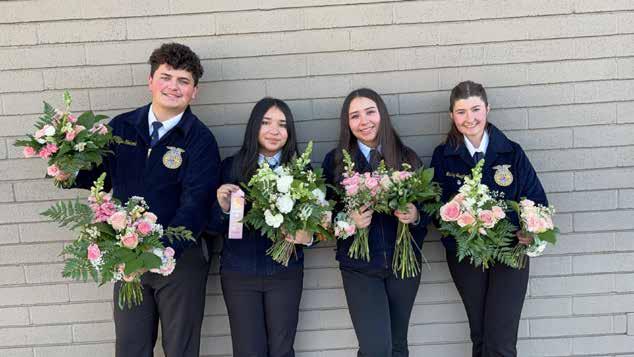

WEBINAR
Resources for California Agricultural Employers
In collaboration with:



Join ABIC and the State of California for a webinar designed to help employers stay up to date on key federal and state regulations.
Rights and Responsibilities Webinar March 17, 2025
1:00 PM
Registration Link: Register Now
This webinar is designed for key agricultural employers and associations.
Agenda Highlights:
Compliance & Readiness – Practical recommendations
Key Topics – I-9 audits, worksite enforcement, No-Match letters
Non-Compliance Consequences – Risks & Penalties
Best Practices – Proactive employer strategies
Overview of AB 450 – Employer obligations & worker protections
Key Labor Code Sections – Regulations on verification & worker rights
Register here.

Managing Lygus in California Cotton: is it a looming threat?
By: Giuliano Galdi, UCCE Merced, Stanislaus and San Joaquin Counties
California has a long history with cotton production, dating back to the early 19th century when missionaries from Mexico introduced the crop to the Golden State. The transition from importing cotton to establishing self-sufficient production happened quickly. By the early 20th century, continuous commercial cotton production had taken root in the Imperial Valley, eventually peaking in the late 1970s, when approximately 1.5 million acres were harvested. California became known for its high-quality fiber.
However, cotton acreage has declined dramatically over the past few decades, with less than 100,000 acres harvested in 2023. While multiple factors contributed to this extremely low acreage harvested in 2023, one wellknown culprit among cotton growers is the lygus bug, also known as the Western Tarnished Plant Bug (Lygus hesperus).
Lygus bugs (fig. 1) are about 0.25 inches long and 0.1 inches wide, with a flattened back. Their feeding habits can cause significant
damage to cotton crops, as they attack the plant from early squaring through cutout and final boll set. When lygus feed on small squares, the damage often causes them to drop from the plant. Larger squares may suffer from incomplete fertilization, leading to abnormal growth. Severe square loss results in excessive vegetative growth, making plants tall and spindly while reducing yield potential. When lygus pierce developing bolls, the damage can lead to seed failure and cause the surrounding lint to become stained yellow, reducing fiber quality. Given the severity of these impacts, effective management strategies are essential.
Managing lygus begins with monitoring field surroundings. Lygus bugs thrive on various host plants and can migrate into cotton fields when surrounding weeds dry out. Keeping adjacent fields free of weeds can help prevent infestations. Additionally, surrounding crops play a role in lygus management. For example, lygus prefer alfalfa over cotton. If an alfalfa field borders a cotton crop, leaving narrow uncut
alfalfa strips during harvest can limit their movement into cotton. These strips also help conserve natural enemies of lygus, supporting biological control.
If cultural practices aren’t enough, insecticide applications may be necessary. The choice of insecticide depends on the severity of the infestation and square retention levels. During early fruiting, if lygus densities are low and square retention is stable or slightly reduced by around five percent, the field should be checked again in three days. If retention remains steady but lygus migration is increasing, selective insecticides that protect natural enemies should be prioritized. Flonicamid (Carbine), afidopyropen (Sefina), novaluron (Diamond), indoxacarb (Steward), or oxamyl (Vydate) are good options in this case. When lygus populations are high
and square retention is poor, insecticides with quick knockdown and residual effects are necessary. Zetacypermethrin (Mustang) and lambda-cyhalothrin (Warrior) are effective choices. Pyrethroids, such as Baythroid, might also control lygus, but there is a potential link between pyrethroid use and aphid population buildup. Additionally, lygus populations (and other insects) have develop resistance to various insecticide, including pyrethroids, so insecticide rotation is always a great choice.
With another cotton season approaching, growers must remain vigilant, especially after recent years of high lygus pressure. Implementing a proactive management strategy, including field monitoring, habitat manipulation, and targeted insecticide use, will be key to protecting California’s cotton crop.


California farm groups look to stabilize workforce amid crackdown on illegal immigration
By: Rebecca Plevin, Los Angeles Times
As the Trump administration cracks down on illegal immigration, California farm groups are working behind the scenes to influence legislative measures that would ensure a stable supply of laborers for the state’s farms and ranches, an industry long reliant on a foreign-born workforce.
The administration’s vows of mass raids targeting undocumented immigrants, combined with its new tariffinduced trade wars, have farmers and labor groups united behind the need for legislation that ensures the U.S. continues producing an ample food supply and has sufficient workers to tend its crops.
But beneath that shared goal a rift has opened around a singular question: Which workforce should be prioritized? Should farming interests push to protect and retain the undocumented workers who have toiled in the country’s fields for years and who, in many cases, have families and community roots? Or should they focus on solidifying the foreign guest worker program that provides a legal channel for importing seasonal laborers on a temporary basis, but offers no path to legal residency and has proved vulnerable to exploitation?
The issue is crucial in California, which grows more than one-third of the country’s vegetables and
more than three-quarters of the nation’s fruits and nuts.
Although a growing number of the state’s farmworkers are hired temporarily through the cumbersome H-2A visa program, at least half of an estimated 255,700 farmworkers are undocumented immigrants, according to UC Merced research, and many have been in the country for more than a decade.
It has been nearly 40 years since federal lawmakers passed a comprehensive immigration reform bill. The Immigration Reform and Control Act of 1986 strengthened border security and introduced civil and criminal penalties for employers who knowingly hired undocumented workers. But it also paved the way for nearly 3 million immigrants in the country without authorization to gain legal status.
Many major farm interests think it’s time for another such reset. But immigration remains one of the most charged topics in the nation’s Capitol, and any agricultural labor bill would need to garner support in a Republican-controlled Congress and White House.
The California Farm Bureau, which advocates for farmers and ranchers, and the influential United Farm Workers union have for years called for reforms that would strengthen the legal pipeline for importing a temporary seasonal workforce and also provide a pathway to legal
residency for undocumented laborers already in the U.S.
They supported the Farm Workforce Modernization Act, a bipartisan bill that has twice passed the House before stalling in the Senate. The measure, written by Rep. Zoe Lofgren, a California Democrat, and Rep. Dan Newhouse, a Republican from Washington state, included a pathway to legal residency for farm laborers who have been working in the U.S. for an extended time period and who pass criminal background checks. It would have amended the agricultural guest worker visa program to streamline the hiring process, improve the availability of decent worker housing and establish a mandatory E-Verify system through which agricultural employers would electronically verify eligibility of their workers.
Though billed as a compromise, the legislation was ultimately sidelined by concerns from the powerful American Farm Bureau Federation and a faction of Republican lawmakers over a provision they feared could expose H-2A employers to lawsuits by workers. There were also concerns that a mandatory E-Verify provision would have significant impacts for farmers.
But with the Trump administration intent on upending the existing immigration system, leaders of California-based farming groups said the timing may be right for getting a comprehensive immigration
measure passed. The bill’s lead authors say they expect to reintroduce a version of the bill soon.
“Sometimes, it’s these kinds of widespread concerns that open the door for an opportunity to fix the issues that just truly haven’t been dealt with for many decades,” said Ryan Jacobsen, chief executive of the Fresno County Farm Bureau.
Meanwhile, the National Council of Agricultural Employers — which advocates for farmers and ranchers involved in labor-intensive agricultural production, and represents about 95% of employers using the H-2A program — has drafted legislation that aims to make the visa program more efficient, according to President and CEO Michael Marsh. It doesn’t provide a pathway to legal status, but Marsh said such a component could potentially be added in upcoming negotiations.
The legislation proposes to expand the types of labor covered under the visa program and allow for year-round employment of H-2A workers, according to a summary shared with The Times. It would eliminate a controversial minimum hourly wage structure for guest workers laid out under the current program unless the Government Accountability Office finds that the employment of H2-A workers undermines the domestic workforce. It would
Immigration continued from page 10
provide over $1 billion for construction and repair of farmworker housing.
It’s intended as a “marker bill,” Marsh said, meaning it contains policy ideas that could be folded into larger pieces of legislation.
The challenge, Marsh said, is to craft a bill that meets the needs of employers, encourages workers already in the country illegally to come out of the shadows — and can earn enough Republican votes to pass out of Congress.
“How do we thread the needle, so that we can make sure that we retain the existing workforce in some type of status that is not offensive to those folks who think it’s just amnesty, but at the same time allow farmers and ranchers in the United States to maintain a workforce and still produce food here?” Marsh said.
An H-2A-focused bill might be a palatable solution in states that are less reliant on undocumented workers and already more dependent on the visa program. But in California, rumblings of such a bill have stirred opposition.
Under H-2A, agricultural employers can hire workers from other countries on temporary permits, so long as they demonstrate an inability to find a sufficient number of available U.S. workers. The employer is required to provide imported workers with food, housing and safe working conditions.
Although the Golden State had among the highest number of certified H-2A workers in 2022, many California growers say the costs of providing housing and a required wage of nearly $20 an hour make the program economically unfeasible in its current form.
Farmworker advocates have also called for changes, saying the program is ripe
for exploitation — because a worker’s permission to be in the country is tied to the employer — and should be bolstered with additional protections.
Manuel Cunha Jr., president of the Fresno-based Nisei Farmers League, said he would “heavily” oppose an H-2A-focused bill if it doesn’t also provide a path to legal residency for longtime farmworkers, including those who were deemed essential amid the pandemic.
“If you were to say you’re going to do a guest worker bill before you take care of the people that are here… I will fight that to the bitter end,” he said. “I’ll join the advocacy groups. I’ll even join the UFW.”
Farming and labor groups say they are still formulating their strategies for pushing significant legislative changes.
The Times was unable to reach several members of Congress who represent
communities in California’s agricultural heartland. Spokespeople for Rep. David Valadao (R-Hanford) and Doug LaMalfa (R-Richvale) did not respond to requests for comment; a spokesperson for Rep. Vince Fong (R-Bakersfield) said he was unavailable for an interview due to his schedule.
Rep. Adam Gray, a Democrat from Merced, said he supports the Farm Workforce Modernization Act and would like to see a pathway to citizenship for agricultural workers. At the same time, he said, he would be open to working on a bill that reforms the H-2A visa program.
“We need to progress on this issue,” he said. “I think a lot of those strident positions that you see in Washington are not reflected when you go out in the real communities. I think you find a lot more Americans on both sides of the aisle that say, ‘Look, get something done.’”

California farmers should get a tax break for overtime paid to their workers | Opinion
By: The Fresno Bee Editorial Board
In 2016 the California Legislature passed Assembly Bill 1066, which gave farm workers the same rights to overtime pay as employees in other industries.
A host of farming groups opposed the measure, saying it would cost growers too much. Instead of paying overtime, the opposing groups said farmers would scale back workers’ hours to keep them from getting extra pay.
And, in fact, that appears to have come true.
A study of the early impacts of AB 1066, done by Assistant Professor Alexandra Hill in the Agricultural and Resource Economics Department at UC Berkeley, concludes that farm workers had their hours cut and actually experienced a loss of earnings as a result of the overtime law.
Now a Republican state senator from Bakersfield is proposing that California farmers get a payroll tax credit to offset overtime wages paid to ag workers. State Sen. Shannon Grove has authored SB 628, and has the backing of the California Farm Bureau and California Association of Wine Grape Growers, which both opposed AB 1066.
“California’s farmers and farm workers are the backbone of our agricultural economy,” Grove, who also represents Clovis, said in a statement announcing her bill. “Unfortunately, overtime mandates have made it harder
for farm workers to get the hours they need and for growers to get their product to market.
“SB 628 is a commonsense solution that ensures farm workers have more opportunities to earn, while providing relief to our agricultural businesses who sustain the world’s food chain supply.”
Relief for California farmers
The bill, if passed by the Legislature and signed by the governor, will let small farmers claim tax credits every quarter; larger operations could take credits more frequently. The bill was introduced Feb. 20 and awaits being heard in committees.
While no estimate has yet been given of how much total credit farmers might get under SB 628, the measure is meant to provide some relief to California growers who produce under the overtime rule, unlike farmers in other states who don’t face such a law.
Brian Little, a spokesman for the Farm Bureau, said that AB 1066 was modeled after an 8 to 5, Monday through Friday work schedule. But the needs of farming often don’t fit that framework.
AB 1066 “ignored the on-the-ground reality of agriculture, of harvesting crops and tending crops when it needs to be done,” he said in a phone
interview.
For example, during the harvest period wine grapes are constantly monitored for picking at just the right moment — whether that is 11 a.m. or 11 p.m.
Workers benefit
In her analysis, Hill said results from the first few years of the law show it was not benefiting workers as expected.
“This early evidence suggests that the law may not be benefiting the workers they aim to protect, but additional research is needed,” she wrote. It was clear workers were not being scheduled as much, she said. That meant they gained free time, or the chance to seek
second jobs.
In a 2023 story, Fresno Bee reporter Melissa Montalvo pointed out that a Kerman farm worker complained the overtime law had dropped his take-home pay from $1,000 to about $600 when his hours were slashed from 60 hours a week to 40 hours per week.
AB 1066 was well intentioned, but as sometimes happens with legislation, created adverse impacts. Grove’s bill looks to expand working hours for farm workers while giving growers a financial break they need. The Legislature would be wise to approve the measure, and Gov. Newsom should sign it.

California’s pesticide enforcers worry DPR notification system undermines existing safeguards
By: Chloe Lovejoy, Agripulse West
California’s Department of Pesticide Regulation is gearing up to release a first-in-thenation pesticide notification system, but county agricultural commissioners and pest control advisers worry the platform’s limitations may generate doubt over existing public safety protections.
Concerns with the tool’s unintended consequences carried over to the March 4 State Board of Food and Agriculture meeting, where newly appointed DPR Director Karen Morrison and department staff provided a software demonstration and took questions.
The final software includes a web mapping tool that allows users to view where applications are happening and sign up for notifications. DPR also included resources for users to learn how pesticides are regulated in California.
SprayDays regulation also requires the department to collect annual feedback and write a three-year report after the system is launched.
Board members raised longstanding issues with the system, for instance, that users could interpret the notifications to mean all pesticide applications pose a human health risk or allow bad actors – such as antipesticide activists – too much access to application
locations.
California Agricultural Commissioners and Sealers Association Executive Director Lindsey Carter highlighted several remaining SprayDays technical issues that need to be resolved. For instance, if an application does not occur after a Notice of Intent is submitted or if an agricultural commissioner denies a request, growers cannot undo their submission and SprayDays users will still be notified.
“I think when you look at the volume of NOIs versus the actual applications, there's potentially some disconnect in the numbers… How do you pass that down to the general public?” said Ruthann Anderson, California Association of Pest Control Advisers president and CEO.
She noted that DPR has not provided growers with a master list of restricted materials, despite requests from CAPCA to do so.
Leia Bailey, DPR deputy
director of communications and outreach, clarified in an email to Agri-Pulse that DPR has a searchable list of both state and federal restricted materials and that the SprayDays platform contains information on California's restricted materials –meaning pesticides used for production agriculture.
Instead, growers may choose to rely on third party software systems to cross-check available material lists. That allows growers to forgo manually entering their NOIs into the agricultural commissioners’ CalAgPermits system, but for an additional cost.
Bailey added that county permit requirements are not considered restricted materials in the "same designation."
Both Carter and Anderson said the notification system may cause the public to undervalue the work agricultural commissioners and pest control advisers

do to ensure safe pesticide application.
State Board of Food and Agriculture member Joy Sterling told her colleagues they should use Carter and Anderson’s presentation to make a list of recommendations for future SprayDays evaluations.
Fellow board member and University of California, Agriculture and Natural Resources Vice President Glenda Humiston went a step further, suggesting that the board send a letter to DPR asking the department to report back on a shorter timeline than required by regulation.
Carter told Agri-Pulse that CACASA would be willing to participate in more frequent program updates over the next year of implementation but doesn't think a letter is necessary.
She hopes the board will continue listening to
See 'DPR Page 14
From small farms to large commercial operations, the INSURICA Agriculture Experts have grown up in agricultural communities.
We’ve designed insurance programs to provide broad and flexible coverage for both your personal and business needs.
agricultural commissioners and applicators experiences with the tool and feels confident the new director will listen to feedback.
“I don't see [Morrison’s] approach being any different, other than moving these things into actual deployment,” said Carter. “We're very much looking forward to a very productive working relationship with Karen, and have only felt that thus far since she has assumed her role.”
She added that the board and other stakeholders should keep a close eye on user data from the first few months of SprayDays deployment, since the 2021 pilot projects showed some users from out of the pilot counties – even out of state – were using the software.
“I think that will really show the success of the program, and [if it is] accomplishing the task that the legislature wanted it to accomplish,” said Carter.
Matthew Allen, Western Growers Association vice president of state government affairs, told Agri-Pulse some of his grower privacy concerns were relieved by DPR settling on a squaremile cap on application locations.
“As long as everybody's following label requirements and anything else, the use of these tools is very safe and effective, and so [SprayDays] is just one additional system that's meant to provide just an additional layer of information to interested parties,” said Allen.
He added that WGA is focused on monitoring implementation to ensure their members understand the NOI process. WGA DPR continued from page 13
continues to educate growers that SprayDays solely tracks restricted use materials within a single square mile area and will remain in touch with DPR after the March 24 launch.
State Board of Food and Agriculture President Don Cameron asked why DPR is not including urban applications like fumigation, despite these being included in the Sustainable Pest Management Roadmap.
Bailey clarified that since the department only receives advanced notice of restricted materials, nonagricultural applications require a “very different process.”
“I think at this stage for getting the system up and running, we wanted to minimize disruptions to the process of how the system was created overall,” said Morrison, adding that the department is keeping other applications in mind as they consider the “broader landscape” of pest management.

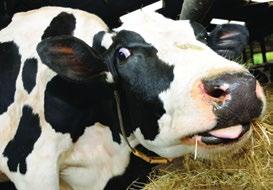




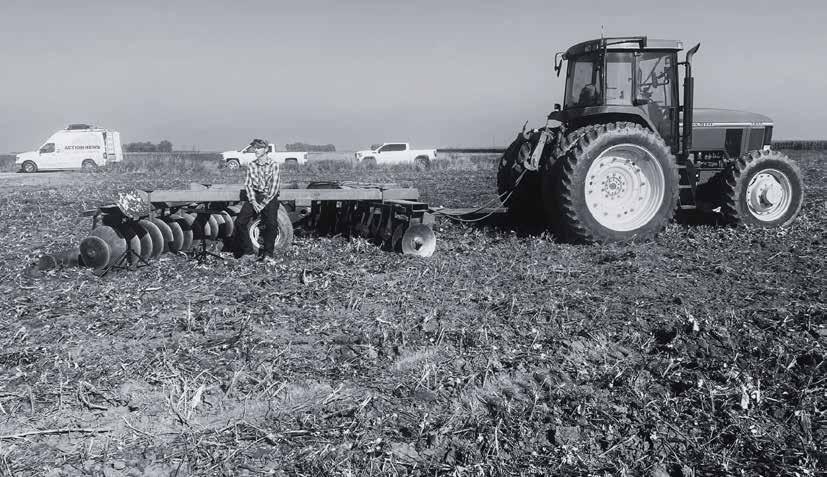







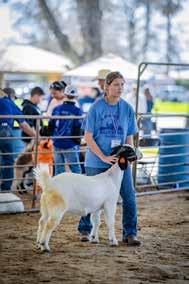
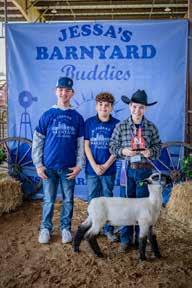
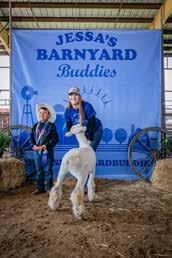

E x h i b i t o r s w i l l “ c e l e b r a t e t h e p o s s i b i l i t i e s ” a v a i l a b l e t o t h e m a s t h e y
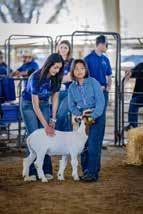
w o r k w i t h v o l u n t e e r s l e a r n i n g a b o u t l i v e s t o c k i n t h e s h o w r i n g A l l
s p e c i a l n e e d s c h i l d r e n w i l l b e p a i r e d w i t h a B u d d y , a n d t h e y w i l l w o r k
w i t h v a r i o u s s h o w l i v e s t o c k l e a r n i n g s h o w m a n s h i p s k i l l s I f t h e
e x h i b i t o r w o u l d l i k e t o p a r t i c i p a t e i n t h e s h o w m a n s h i p c o m p e t i t i o n
a f t e r l u n c h , t h e y c a n c h o o s e w h i c h s p e c i e s t h e y w o u l d l i k e t o e x h i b i t .
L u n c h w i l l b e p r o v i d e d f o r a l l e x h i b i t o r s a n d v o l u n t e e r s f o r f r e e a n d
a v a i l a b l e f o r p u r c h a s e f o r e v e r y o n e e l s e W e ’ v e a l s o p l a n n e d o t h e r f u n
a c t i v i t i e s , p r e s e n t a t i o n s , a n d a p e t t i n g z o o T h e s h o w m a n s h i p
c o m p e t i t i o n i s d i v i d e d u p i n t o c a t e g o r i e s b a s e d o n t h e i r a b i l i t i e s a n d
g r a d e l e v e l . T h e r e a r e a w a r d s f o r B e s t D r e s s e d , C o n g e n i a l i t y , i n
a d d i t i o n t o o t h e r a w a r d s A t t h e e n d o f t h e d a y t h e r e w i l l b e a
l i v e s t o c k s a l e o f t h e a n i m a l s t h a t h a v e b e e n d o n a t e d
T h e n e x t J e s s a ’ s B a r n y a r d B u d d i e s L i v e s t o c k E x p e r i e n c e w i l l t a k e
p l a c e o n S a t u r d a y M a r c h 2 9 , 2 0 2 5 , a t t h e L o s B a n o s F a i r g r o u n d s P a r k
Y o u c a n a l s o f i n d u s h o s t i n g p e t t i n g z o o s a t o t h e r e v e n t s s u c h a s t h e
A u t i s m A w a r e n e s s e v e n t h e l d b y t h e L o s B a n o s F i r e D e p a r t m e n t ,
T r u n k o r T r e a t i n D o s P a l o s , o t h e r s c h o o l s a n d o r g a n i z a t i o n s A g d a y s
a n d o n a f l o a t a t t h e 4 t h o f J u l y P a r a d e i n G u s t i n e
E x h i b i t o r s a n d v o l u n t e e r s r e g i s t e r f o r J e s s a ’ s B a r n y a r d B u d d i e s
L i v e s t o c k E x p e r i e n c e o n l i n e b y v i s i t i n g t h e w e b s i t e b e l o w
h t t p s : / / s h o w m a n a p p / s h o w s / # / j e s s a s - b a r n y a r d - b u d d i e s - 4 8 9 e

M a i l i n g A d d r e s s P O B o x 2 2 D o s P a l o s , C A 9 3 6 2 0
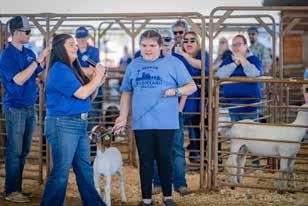

Financial support for almond growers is available from a variety of federal, state, and local agencies and from nongovernmental organizations ABC’s incentives page can help you search for available funding opportunities for irrigation system improvements to ensure your system is running at peak performance and efficiency

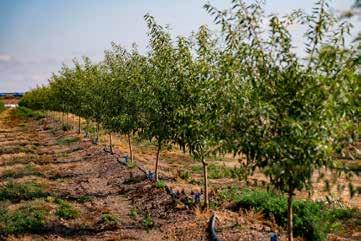

Scan the QR code to learn more about grants and incentives for almond growers


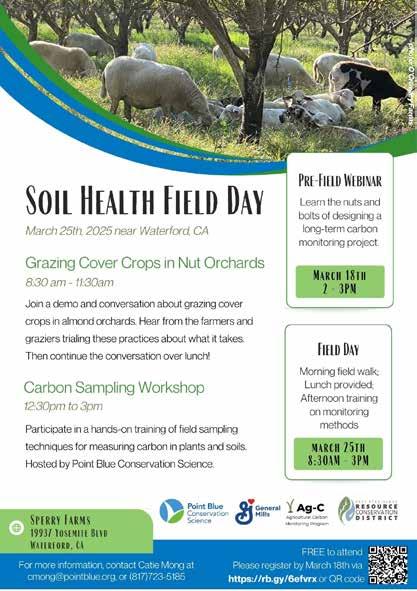
Scan the QR code to find your Local RCD for free or low cost distribution uniformity tests for your irrigation system.



Kicking the Can Down the Road
It’s way passed time to stop kicking the can down the road and pass the Farm Bill. This bill is one of the most serious pieces of legislation for the United States, affecting everything from food security and agricultural sustainability to rural development and environmental conservation. Passed approximately every five years, the Farm Bill is an inclusive package that leads agricultural policy and funding, impacting farmers & ranchers, consumers, and the entire economy. Its passage is crucial to maintaining a stable and resilient food system that benefits all Americans.
One of the key reasons for passing a Farm Bill is to guarantee food security for millions of Americans. Programs like the Supplemental Nutrition Assistance Program (SNAP), which provides assistance to low-income families, are funded through the Farm Bill. Without this legislation, millions of Americans would face higher levels of food insecurity, making it harder for families to afford healthy foods.
American farmers & Ranchers rely on the Farm Bill for financial and technical support. The legislation provides funding for crop insurance, conservation programs,
and disaster relief, ensuring that farmers & ranchers can continue producing food despite economic uncertainties and weather challenges. Without these provisions, many small and mid-sized farms & ranches would struggle to survive. It assigns funds for infrastructure, broadband expansion, and rural business
development.
Agriculture is the foundation of the American economy, adding billions of dollars in revenue and employing millions of people. The Farm Bill adds to economic growth by providing trade support, research, and market access programs for farmers & ranchers. Passing this
legislation ensures a thriving agricultural sector that supports economic stability and national food independence. The kicked can has taken quite a beating, it’s time to work together and finally take action for Americans by passing the Farm Bill.


Merced County Business Member Directory
Businesses Supporting the Farm Bureau
To be included in the directory, join Merced County Farm Bureau as a business member by calling (209) 723-3001.
Farm Equipment
Garton Tractor, Inc........................(209) 726-4600
Kirby Manufacturing......................(209) 723-0778
N&S Tractor.....................................(209) 383-5888
Holt Ag Solutions.............................(209) 723-2021
Real Estate
Flanagan Realty................................(209) 723-4337
Keller Williams Property Team....(209) 769-4698
Dick Templeton Property Team...(209) 761-4441
Groups & Organizations
California Farmland Trust...............(916) 544-2712
California Sweetpotato Council.(209) 385-7403
Hilltop Ranch Inc................................(209) 874-1875
Merced Boosters..............................(209) 761-0815
Turlock Irrigation District.............(209) 883-8205
UCCE Merced...................................(209) 385-7403
Water & Land Solutions..................(209) 677-4700
Farm Services
Agri-Valley Consulting...................(209) 769-2357
Cal Ag Safety....................................(209) 351-0321
Dutch Door Dairy............................(209) 648-2166
GAR Bennett....................................(559) 480-3029
J&F Fertilizer.....................................(209) 495-1964
Mid Valley Ag Service.....................(209) 394-7981
Stone Family Spreading..................(209) 756-1491
WTS McCabe LLC............................(209) 854-6818
Construction Contractors
M-Mig Construction, Inc...............(209) 724-9488

Repairs & Services
Arrowhead Field Repair LLC.......(209) 658-5250
Cab Air Systems.............................(209) 551-3301
SS Blue...............................................(209) 722-2583
Food Processing
Del Rio Nut Company.....................(209) 394-7945
Sensient Natural Ingredients......(800) 558-9892 Harvesting & Hauling
Wallace & Son..................................(209) 382-0131
Irrigation,
Wells & Septic
Allison Sierra, Inc............................(209) 966-4082
IJ Larsen Pumps...............................(209) 634-7276
Pacific Southwest Irrigation......(209) 460-0450
Precision Aqua.................................(209) 756-2025
Quality Well Drillers........................(209) 357-0675
Rain for Rent.....................................(559) 693-4315
San Luis Pump Company..............(209) 383-0464
SWAN Systems................................(661) 335-2649
Farm Supplies
American River Ag..........................(209) 385-9553
Cal Farm Service..............................(209) 358-1554
Kellogg Supply...................................(209) 722-1501
Livingston True Value......................(209) 394-7949
Marfab...............................................(209) 826-6700
Pacific Bay Equipment...................(800) 640-1227
Stanislaus Farm Supply.................(209) 723-0704
Fuel Services
Amarants Propane Service...........(209) 358-2257
Hunt & Sons, Inc................................(916) 383-4868
Pazin & Myers, Inc............................(209) 725-2050
Western States Petroleum Assoc.. (661) 321-0884
Valley Pacific Petroleum................(209) 948-9412
Insurance
Barlocker Insurance......................(209) 383-0220
Fluetsch & Busby Insurance...........(209) 722-1541
InterWest Insurance........................(209) 723-9181
Rico, Pitzer, Pires & Associates.(209) 854-2000
Walter Mortensen Insurance......(209) 353-2700
Winton Ireland Insurance..............(209) 394-7925
Financial Services
Alice B. Contreras CPA..................(209) 722-6778
American Ag Credit Merced.......(209) 384-1050
American Ag Credit Los Banos..(209) 826-0320
Central Valley Community Bank.(209) 725-2820
Farmers & Merchants Bank.........(209) 626-4118
Grimbleby Coleman CPAs............(209) 527-4220
Yosemite Farm Credit Merced....(209) 383-1116
Yosemite Farm Credit Los Banos.. (209) 827-3885 Miscellaneous Sunset Pool Service........................(209) 286-7665
Ensz (Solar) .....................(209) 204-0702
Resources Corp ...........(661) 421-3515
Business Support Farmers DCB Farming, LLC
Mariposa County Business Member Directory
Farm Supplies
Mariposa Feed & Supply...............(209) 966-3326
Mariposa County Farm Bureau....(209) 742-5875
35-A District Agriculture Assn....(209) 966-2432
Mariposa County Ag Commissioner..(209) 966-2075
Allison Sierra, Inc............................(209) 966-4082
Chases Foothill Petroleum............(209) 966-3314
Edward Lien & Toso Ag Appraisers... (209) 634-9484 Rain for Rent......................................(559) 693-4315
Ranch Fence, Inc..............................(209) 966-5914
Valley Pacific Petroleum...............(209) 948-9412
966-2527
966-5444
966-2719





